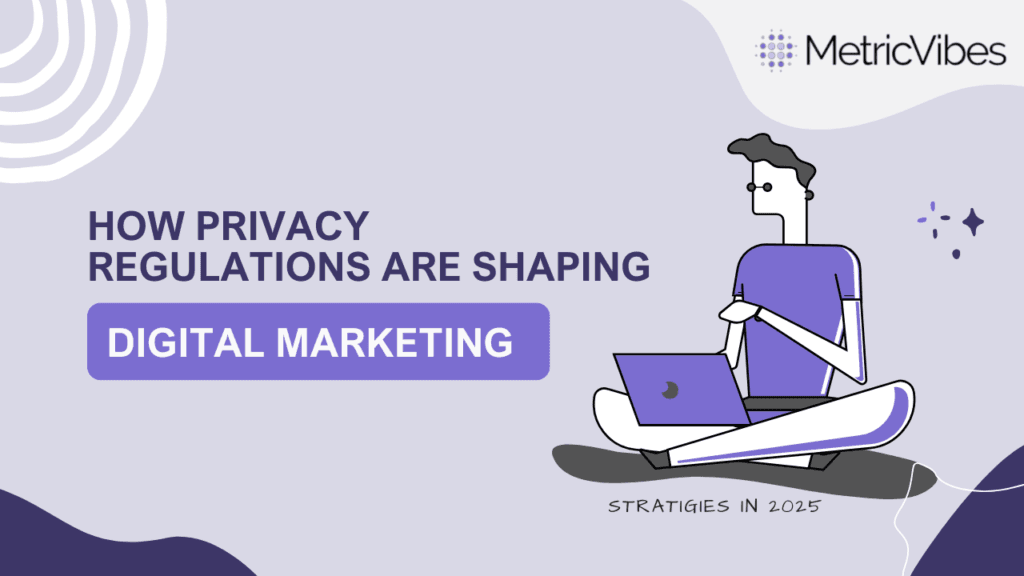How Privacy Regulations are Shaping Digital Marketing in 2025
In the modern digital landscape, privacy regulations have become a driving force behind the evolution of marketing strategies. Laws such as the General Data Protection Regulation (GDPR) in the European Union and the California Consumer Privacy Act (CCPA) in the United States have introduced stringent rules governing how businesses collect, store, and utilize consumer data. These Privacy Regulations are Shaping Digital Marketing by demanding greater transparency, accountability, and respect for consumer privacy.

Reach out for tailored analytics and personalization solutions for your business by us. Contact Here
The Impact of GDPR and CCPA Privacy Regulations are Shaping Digital Marketing
1. Stricter Data Collection Practices:
GDPR and CCPA have fundamentally changed how businesses approach data collection. GDPR requires companies to have a clear legal basis for processing personal data, often necessitating explicit user consent. CCPA mandates that businesses inform consumers about the types of personal data collected and how it will be used, emphasizing transparency. These regulations have led to more stringent data collection practices, with businesses needing to provide clear, accessible privacy policies and obtain user consent before gathering personal information.
2. Opt-In/Opt-Out Requirements:
Both GDPR and CCPA emphasize consumer choice in data sharing. GDPR enforces an opt-in model where users must actively consent to data collection, particularly for purposes such as targeted advertising. On the other hand, CCPA allows consumers to opt out of the sale of their personal information, requiring businesses to provide a “Do Not Sell My Personal Information” option. This shift towards user control means marketers must now design strategies that respect consumer choices, balancing personalization with privacy.
3. Increased Reliance on First-Party Data:
As third-party cookies face increasing restrictions due to privacy concerns, businesses turn to first-party data—information collected directly from consumers through interactions with websites, apps, and other owned channels. This data is often seen as more reliable and compliant with privacy regulations. By prioritizing first-party data, businesses can create more personalized and meaningful consumer interactions, fostering stronger relationships while respecting privacy laws.
4. Impact on Targeted Advertising:
The limitations on third-party data usage have significantly impacted targeted advertising. Marketers now need to be more innovative in how they reach their audiences. Contextual advertising, where ads are served based on the content of the page rather than the user’s browsing history, is gaining traction as a privacy-friendly alternative. This shift requires marketers to rethink their strategies and leverage more sophisticated tools and technologies to achieve advertising goals without infringing on user privacy.
How Businesses Benefit from Privacy Regulations
While privacy regulations might initially seem like a burden, they offer several strategic advantages:
1. Building Trust and Loyalty:
By complying with privacy regulations, businesses can build trust with their customers, fostering loyalty and long-term relationships.
2. Improved Data Quality:
With a focus on first-party data, businesses collect more accurate and relevant information, leading to better-targeted marketing campaigns.
3. Enhanced Customer Experience:
Privacy regulations encourage businesses to use data in ways that benefit the customer, leading to more personalized and satisfying experiences.
4. Competitive Advantage:
Companies that adapt quickly to privacy regulations can differentiate themselves and gain a competitive edge in the market.
5. Reduced Risk and Costs:
Compliance reduces the risk of legal penalties and the costs associated with data breaches.
6. Innovation in Marketing Strategies:
Privacy regulations drive innovation, pushing businesses to explore new, privacy-friendly marketing techniques.
7. Global Market Opportunities:
Compliance with international standards like GDPR opens up new markets and customer bases globally.
Conclusion
Privacy regulations like GDPR and CCPA are not just legal requirements; they represent a fundamental shift in how businesses interact with consumers in the digital age. By prioritizing transparency, focusing on first-party data, and adopting privacy-friendly marketing tactics, businesses can not only comply with these regulations but also build stronger, more trusted relationships with their customers. As the landscape continues to evolve, staying ahead of privacy trends will be essential for maintaining a competitive advantage and delivering effective marketing campaigns.
By embracing these changes, businesses can turn the challenge of privacy regulations into an opportunity for growth and innovation. Let us work on this together!

